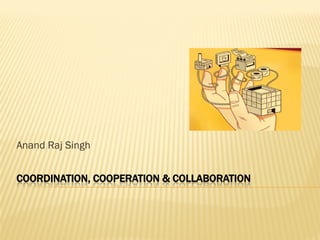Coordination, Cooperation & Collaboration In The Supply
- 1. COORDINATION, COOPERATION & COLLABORATION Anand Raj Singh
- 2. 3 LEVELS PRECEDING COLLABORATION  Arm-Length Relationship  Cooperation  Coordination  Collaboration
- 3. DEFINING LEVELS OF RELATIONSHIP  Arm-Length Less Investment, Least, Information Sharing, Limited Interaction  Cooperation Managing Increasingly Complicated Flow of Information  Coordination Information System Strongly Linked & More Emphasis on Strategy  Collaboration Committed Relationship Without Involving Equity
- 4. TYPES OF COLLABORATION Type-1  Involves Traditional Logistics Management  Channel Partners Connected by IT  Skill Substitution Type-2  Non-Logistics Activities & Functions  Strategic Alliances Across Industries & SC  Organizational Learning
- 5. ELEMENTS OF COLLABORATION HOW COMPANIES INTERACT MEANS COMPANIES INTERACT  Trust  Commitment  Balance of Power & Cultural Differences  Information Systems  Collaborative Controlling Systems  Reward & Risk Sharing  Joint Decision Making  Conflict Management
- 6. ACHIEVING 3C’S IN CHANNEL PARTNERS  Establishing Trust  Developing Mutual Objectives  Developing True Commitment to End Goal
- 7. CON-AGRA FOODS (INDIAN ARM) A Case Study i2 Supply Chain Strategist East West North South A---------B-----------C (Categories of Towns) CFA Warehouses (In all 5 regions) NCR 3P Manufacturing Units Distribution Points 1500+ R-1 R-6R-5R-4R-3R-2 SKU’s (175 Total)Logistics Supply Chain Collaboration Con-Agra Foods Inc. - INDIA Demand Planning Supply Planning 150000 +(Hundred Fifty Thousand +) retail Outlets
- 8. CHALLENGES IN COLLABORATION (DOWNSTREAM)  Doing Things Primitive Way  Conventional Accounting Practices  Tax Laws  Antitrust Laws  Limited View of Supply Chain
- 9. CHALLENGES IN COLLABORATION (DOWNSTREAM)  Annual Negotiation Process  Time  Bad Communications  Inconsistency  Betrayal
- 10. RELATIONSHIP SKILLS OF A SUPPLY CHAIN MANAGER  Ability to Plan for Unexpected  Acclimatizing Mindset  Ability to Define Benefits of Collaboration  Reliability & Approachability  Psychology Tracking Skills  Listening Skills  Influencing Skills
- 11. CONCLUSION The move from domestic to global supply chain management requires a new way of dealing with supply channel partners. Global outsourcing practices demand that management learn how to build relationships that allow all channel members to prosper. Individual managers must learn to develop their relationship building skills in order to take full advantage of the coordination, cooperation and collaboration opportunities available to their companies.
- 12. THANK YOU












